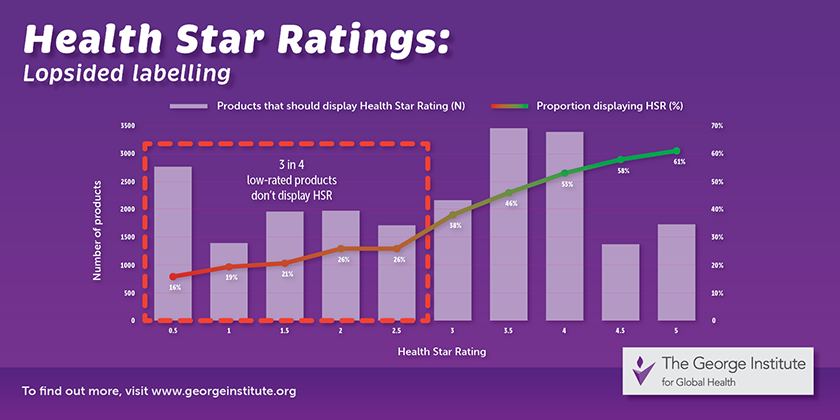Lopsided labelling: Latest data confirms selective Health Star Rating uptake persists

New research published in European Journal of Clinical Nutrition confirms uptake of Health Star Ratings remains heavily skewed towards healthier products, limiting the utility of the system for consumers. This study builds upon reporting of overall low HSR uptake by examining the distribution of uptake by HSR score.
Uptake was unevenly distributed across 21,197 products in the 2023 Foodswitch database, reinforcing the positive move by Australian and New Zealand Food Ministers last month to commence the legal work needed to enable a swift move to a mandated system in a year’s time.1 Based on performance to date, industry is highly unlikely to meet the government’s target of 70% of intended products voluntarily displaying an HSR by November 2025.

In this dataset, only 37% (8,173) of products displayed an HSR. Of items achieving 5 stars, 61% showed the HSR on pack, but only 16% of products ranked 0.5 stars did so. Only 24% of products with fewer than 3 stars displayed an HSR, compared to 53% of those scoring more than 3.5 stars.
Author and Research Associate in Food Policy at The George Institute for Global Health, Mariel Keaney, says the low uptake and avoidance of displaying lower ratings indicate the HSR system is still primarily being used as a marketing tool, rather than as a means of disclosing important health information.
“Front-of-pack nutrition labelling (FOPNL) is recommended by the World Health Organisation as a cost-effective, evidence-based method to promote healthier diets and prevent noncommunicable diseases,” she said. “Selective display of the HSR reduces the value of the Government’s flagship labelling system for consumers trying to make healthy choices.”
Dr Alexandra Jones, Food Governance Program Lead at The George Institute, says this research is an important contribution to evidence supporting the pressing need for mandatory HSR uptake.
“This new way of looking at uptake adds weight to existing concerns that the industry will miss its final targets. A mandatory system will help level the playing field within the industry and provide better incentives for product reformulation to achieve higher ratings,” she said.
Stay connected and updated
Subscribe to our mailing list for the latest news, events, and updates in health research.

